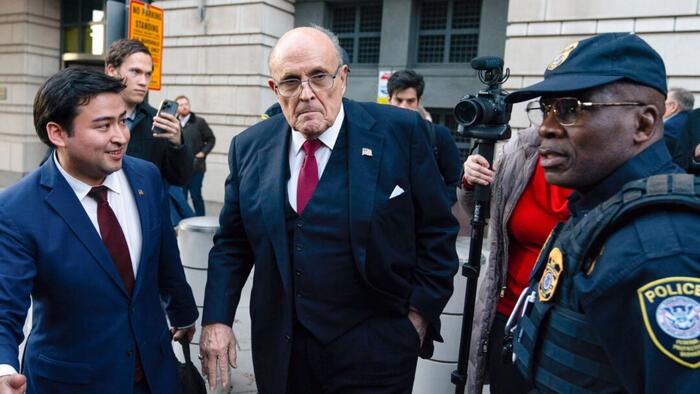Former New York City Mayor Rudy Giuliani is facing a pressing legal challenge following a substantial defamation judgment against him amounting to nearly $150 million. The ruling stems from a lawsuit filed by Georgia election workers Ruby Freeman and Shaye Moss, who accused Giuliani of making false claims about their involvement in voter fraud during the contentious 2020 presidential election. As part of the court’s resolution, Giuliani has until November 11 to transfer assets from his Palm Beach property to the law firm representing the plaintiffs, a move that underscores the significance of the legal repercussions stemming from his statements.
In a recent court session, Judge Lewis Liman outlined the requirement for Giuliani to surrender his Manhattan apartment and other valuable possessions to fulfill the defamation judgment. Giuliani’s attorney, Kenneth Caruso, has signaled intentions to contest the judgment on various legal grounds, seeking to challenge the transfer order on technicalities. During a heated hearing, Caruso characterized the transfer demands as “vindictive,” particularly focusing on the requirement to relinquish a watch that belonged to Giuliani’s grandfather, a sentiment rebuffed by Judge Liman. The judge asserted that under New York law, there is no distinction between assets based on sentimental value.
The complexity of Giuliani’s financial situation became evident during the recent court proceedings when contentious exchanges arose regarding his assets. This included discussions about various forms of wealth owned by the former mayor, such as real estate, vehicles, jewelry, and cash. Judge Liman expressed frustration over what he deemed vague and evasive responses from Giuliani’s defense team, emphasizing that claiming ignorance about his client’s assets was implausible. Such exchanges highlight the intensity of the litigation and the pressure on Giuliani to comply with the court’s decisions regarding asset transfers.
Giuliani himself addressed the court, voicing concerns about the nature of the questioning directed at individuals close to his financial affairs, deeming some inquiries inappropriate. Contrastingly, the judge reminded Giuliani that avoiding direct and truthful answers would not be tolerated, ensuring that there would be no circumvention of the legal process regarding the asset transfer. This dynamic illustrates the various challenges Giuliani faces as he attempts to navigate the legal landscape while also responding to the court’s requirements.
Caruso confirmed that certain assets, including valuable jewelry and watches, are currently located in Palm Beach and are ready for transfer. However, complications arose with other items stored in a New York facility, which Giuliani’s camp claims they cannot access. The ongoing legal battles between Giuliani’s representation and the law firm advocating for the plaintiffs exemplify the intricate realities of asset management under judicial scrutiny, raising questions about compliance and adherence to court directives.
Overall, the developments surrounding Giuliani reflect broader themes of accountability and legal obligations tied to public statements. As the former mayor navigates the defamation judgment, he faces significant challenges, from questions surrounding his assets to the legal ramifications of his earlier claims about election fraud. The outcome of this case not only impacts Giuliani personally but also sets a precedent regarding the limits of public figures’ assertions in the face of serious allegations and the accountability mechanisms that follow. The struggle over asset transfers underscores the complexities of legal repercussions tied to public discourse, particularly in the fraught political climate following the 2020 presidential election.

